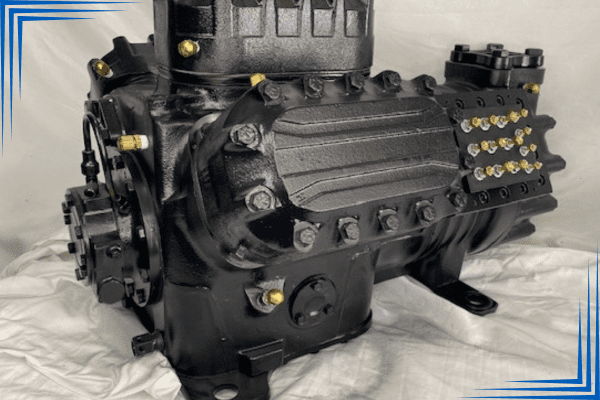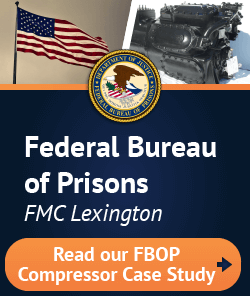Copeland commercial compressors are widely used in HVAC/R (Heating, Ventilation, Air Conditioning, and Refrigeration) systems for their reliability and efficiency. However, like any mechanical equipment, they can face issues if not properly maintained. Understanding the common problems of these complex machines and their prevention care can save time, money, and headaches for commercial HVAC/R technicians. Let’s explore some typical issues with Copeland commercial HVAC/R compressors and practical ways to address them.
1. Overheating Copeland Compressor
Overheating is one of the most common issues faced by commercial HVAC/R compressors. This problem often stems from inadequate cooling, high system pressures, or poor airflow across the condenser.
Causes:
- Blocked or dirty condenser coils.
- Insufficient refrigerant levels.
- High ambient temperatures.
Prevention Tips:
- Clean condenser coils regularly to ensure proper heat dissipation.
- Check refrigerant levels during routine maintenance and fix any leaks immediately.
- Ensure proper ventilation around the compressor to prevent heat buildup.
2. Refrigerant Issues with Copeland Compressors
Refrigerant problems, such as undercharging, overcharging, contamination, and even using the incorrect oil, can significantly impact the performance of a Copeland commercial compressor.
Causes:
- Incorrect refrigerant type or charge.
- Moisture or air in the refrigerant lines.
- Contamination with dirt or debris.
Prevention Tips:
- Always use the correct refrigerant and oil as specified by the manufacturer. If you are unsure which refrigerant to use, contact one of our technicians at Compressors Unlimited.
- Properly evacuate and recharge the system to eliminate air and moisture.
- Install filters and dryers to prevent contaminants from entering the system.
3. Copeland Compressor Electrical Failures
Electrical issues are another common culprit behind commercial HVAC/R compressor malfunctions. They can lead to overheating, short circuits, or complete failure of the unit.
Causes:
- Faulty wiring or loose electrical connections.
- Losing a leg of power, possibly during a storm.
- Overvoltage or undervoltage conditions.
- Failed capacitors or contactors.
Prevention Tips:
- Inspect wiring and connections during regular service visits.
- Use a multimeter to verify voltage levels and troubleshoot anomalies.
- Replace worn-out electrical components before they fail entirely.
4. Oil Issues with Copeland Compressors
Oil is essential for lubricating the internal components of a commercial HVAC/R compressor. Problems with oil can lead to excessive wear and tear, reducing the lifespan of the equipment.
Causes:
- Insufficient oil levels due to leaks.
- Contaminated or degraded oil.
- Improper oil type.
Prevention Tips:
- Check oil levels periodically and top off as needed.
- Use only manufacturer-recommended oil types. If you have questions about which type of oil to use, contact one of our professional technicians.
- Address any oil leaks promptly to prevent further damage.
5. Copeland Compressor Mechanical Failures
Mechanical issues often arise from excessive wear, improper installation, or operating conditions outside the compressor’s specifications.
Causes:
- Misaligned components.
- Excessive vibration or noise.
- Running the compressor beyond its capacity.
Prevention Tips:
- Follow Copeland’s installation guidelines to ensure proper alignment and mounting.
- Inspect for signs of wear or damage during routine maintenance.
- Avoid overloading the system or running it outside its specified parameters.
6. System Contamination
Contamination within the system can lead to restricted flow, reduced efficiency, and potential damage to the compressor.
Causes:
- Debris, dirt, or rust in the system.
- Moisture entering the refrigerant lines.
- Poor maintenance practices.
Prevention Tips:
- Use a clean environment when servicing the system to avoid introducing contaminants.
- Flush the system if contamination is suspected.
- Replace filters and dryers as part of routine maintenance.
7. Copeland Compressor Starting Issues
Commercial HVAC/R compressors may have difficulty starting or may not start at all due to various reasons.
Causes:
- Faulty start components like capacitors or relays.
- Low voltage supply.
- Mechanical lockup.
Prevention Tips:
- Test and replace starting components when they show signs of wear.
- Verify voltage levels and address any supply issues.
- Lubricate and maintain mechanical parts to prevent lockup.
8. Excessive Noise and Vibration
Unusual noise and vibration can indicate underlying problems that need immediate attention.
Causes:
- Loose mounting bolts.
- Internal component wear.
- Foreign objects inside the compressor.
Prevention Tips:
- Securely tighten all mounting hardware.
- Inspect internal components for damage or wear.
- Keep the compressor area clean to avoid foreign object intrusion.
Success to Copeland HVAC/R Commercial Compressors
Copeland commercial HVAC/R compressors are built to last, but even the best equipment can face issues if neglected. Regular maintenance, thorough inspections, and adhering to the manufacturer’s guidelines are the keys to preventing problems. By addressing issues early and maintaining proper service practices, commercial HVAC/R technicians can ensure these compressors perform reliably for years to come.
When in doubt, consult our technical support or service manuals for detailed troubleshooting and maintenance instructions. Keeping these best practices in mind will not only save money but also enhance customer satisfaction and system efficiency.












